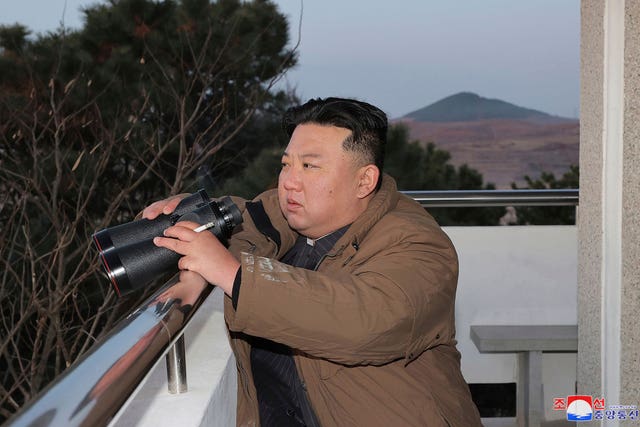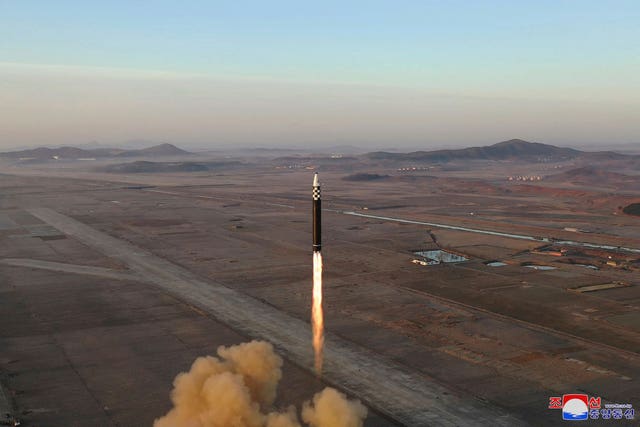North Korea says missile launch was response to rivals’ drills
It remains unclear whether North Korea has developed nuclear bombs small enough to fit on its long-range rockets.

North Korea said it fired an intercontinental ballistic missile (ICBM) to “strike fear into the enemies” as South Korea and Japan agreed to work closely on regional security with the US and staged military exercises around the region.
The missile was launched on Thursday morning, hours before South Korean President Yoon Suk Yeol met with Japanese Prime Minster Fumio Kishida at a summit partly aimed at rebuilding security ties between the US allies in the face of North Korean nuclear threats.
With four missile displays in about a week, North Korea has ratcheted up its tit-for-tat response to ongoing US-South Korean military drills that are the biggest of their kind in years.
The Biden administration wants better South Korea-Japan ties, which declined over historical issues in recent years, as it pushes to strengthen its alliance network in Asia to counter the North Korean nuclear threat and China’s rising influence.

Aside from their combined exercises that began on Monday and run through March 23, the US and South Korea are also participating in anti-submarine warfare drills, along with Japan, Canada and India, that began on Wednesday.
North Korea’s official Korean Central News Agency (KCNA) said leader Kim Jong Un supervised the test-firing of the Hwasong-17 missile and stressed the need to “strike fear into the enemies” over what it called the “open hostility” shown to the North by the US-South Korea exercises.
Launched at a high angle to avoid the territory of North Korea’s neighbours, the missile reached a maximum altitude of 6,045 kilometres (3,756 miles) and travelled 1,000 kilometres (621 miles) before landing in waters off the country’s eastern coast, KCNA said.
The South Korean and Japanese militaries assessed the flight similarly, indicating the the US mainland is within the missile’s range.
It remains unclear whether North Korea has developed nuclear bombs small enough to fit on its long-range rockets or the technology to ensure its warheads survive atmospheric re-entry when fired at a normal trajectory.
North Korea’s official Rodong Sinmun newspaper published photos of Mr Kim watching from afar as the missile blasted off from a launch vehicle parked on an airport runway.
Mr Kim was accompanied by a girl who appeared to be his daughter, believed to be named Kim Ju Ae and about 10-years-old.
She has accompanied him to several military events since she was publicly revealed for the first time during another ICBM launch in November.

Analysts say the intent of her public appearances at military events is to tie the dynastic rule of Mr Kim’s family to the nuclear arsenal Mr Kim sees as the strongest guarantee of his survival.
Rodong Sinmun also published photos implied to have been taken by a camera on the missile as it soared into space. They showed a rounded view of the Earth, with clouds scattered over what appeared to be the Korean Peninsula and Asian coastline.
The photos were apparently intended as proof the missile would be capable of accurately striking its target, said Cheong Seong-Chang, a senior analyst at South Korea’s private Sejong Institute.
KCNA said the ICBM launch sends a “stronger warning” to North Korea’s rivals who are escalating tensions with their “frantic, provocative and aggressive large-scale war drills”.
Mr Kim said it is crucial for North Korea’s nuclear missile forces to maintain readiness to counterattack rivals with “overwhelming offensive measures anytime” and make them realise their persistent and expanded military actions will “bring an irreversible, grave threat to them”, according to KCNA.
Lee Hyojung, spokesperson of South Korea’s Unification Ministry, which handles inter-Korean affairs, said it is deeply regrettable that the North continues to use the US-South Korean military drills as an excuse to stage provocative military demonstrations.
“It’s clear that North Korea’s reckless nuclear and missile development is the cause of escalating tensions on the Korean Peninsula,” she said, urging Pyongyang to return to dialogue.





